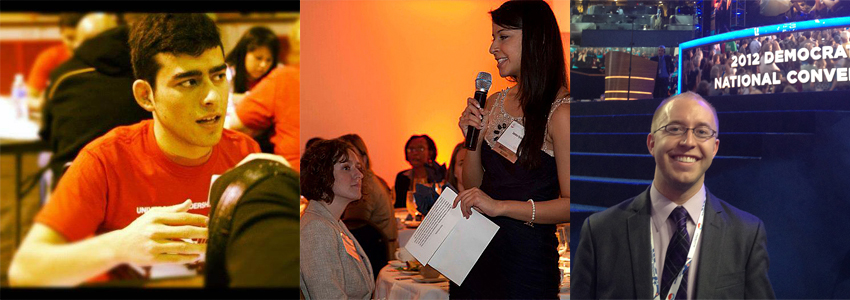See additional profiles » » DOWNLOAD PDF OF ALL 20 PROFILES » »
"I hope one day to be a candidate myself": More profiles of politically active youth
September 17 , 2012
Salaina Catalano, 20, Rochester Hills, MI
by Priya Mirmira, 15, Y-Press
Salaina Catalano is a strong supporter of political activism among youth. During 2008, Salaina started out small by volunteering for the Obama campaign and making calls on his behalf. However, after she enrolled in Albion College, she increased her political activity. Now a junior, she is president of the Albion College Democrats, where she is in charge of planning events and recruiting members. She also started Students Organized for Political Awareness, a club that encourages political discussions minus the personal attacks.
Salaina eventually wants to go into politics, though she’s met with little enthusiasm from her extended family. “I want to go into it to prove them wrong,” she says, “I want to disprove that stereotype, I guess. There’s a lot of cynicism about politics.”
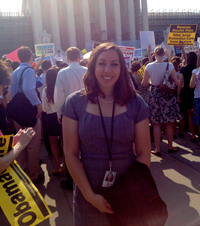 What inspired you to get involved in politics?
What inspired you to get involved in politics?
I’ve always been interested in politics. Like one of my earliest memories was going to a Bill Clinton rally in ’96. I grew up in a pretty politically active family—they taught me to be a Democrat. I may be the president of College Democrats, but I am a big believer in voting for a person, not the party. Like the first time I voted was in 2010, and I voted for a Republican for governor just because I thought he’d do a better job.
What issue do you think is most pressing for our country and why?
Education because without basic education for everyone — no, not just basic, a good education, a great education for everyone—people aren’t educated enough to talk about any other issue. We need to strive for a high level because that’s the starting point for every other discussion we have.
Which presidential candidate would you most want to talk to and what would you discuss?
I’d want to talk to Mitt Romney. I want to ask him about that article he wrote, it was titled “Let Detroit Go Bankrupt.” That just really makes me mad. He obviously has a reason for saying that, and I understand that, but I want to know more. Why he would kind of argue against the auto company bailout that President Obama passed that worked? I just want to hear his thoughts on that.
To me he seems like a moderate, and I want to find out if he really is because then I would consider voting for him, to be honest.
Marcus Demery, 20, Indianapolis, IN
by Carmela Verderame, 12, Y-Press
Marcus Demery is a freelance photographer who just returned from spending seven months with Occupy Chicago. Not only did he share the same passion for change with the crew there, he also got a chance to perfect his craft. Like other Occupiers, Demery believes change needs to come from the grassroots, not from either political party.
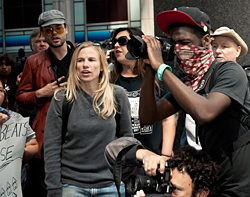 “I am neither Democratic or Republican. I believe that everyone deserves equal rights as citizens living in this free nation. What Occupy has done is empower people and give them back the necessary skills and the necessary qualities that they need in order to work with each other and to create change globally.”
“I am neither Democratic or Republican. I believe that everyone deserves equal rights as citizens living in this free nation. What Occupy has done is empower people and give them back the necessary skills and the necessary qualities that they need in order to work with each other and to create change globally.”
What was your primary responsibility with Occupy Chicago?
Honestly, it was just to take photos. I was working with the Occupy Chicago press committee, the social media committee. I was running the Twitter feed. I was running the Facebook page. As a photographer, it was my duty to go out to every protest, every business station, every community event, so that way we could document everything that was happening that was a part of Occupy Chicago.
Could you name an event involving Occupy that you felt was especially successful?
Yes, it was the Chicago NATO and G8 summit protest, a grueling, 17-hour, on-the-ground event from the beginning, 7 a.m. to probably maybe 12:00 a.m. the next day. My involvement was simply to be a photographer, to document everything that was happening, to make sure that my partners were safe, to make sure that I could document as much as I could any unethical or illegal things that were happening as far as what the police officers were doing to nonviolent protesters and so forth.
The things that I saw that the Chicago police officers committed were unnecessary, unethical and probably illegal. However, it was quite successful because of the community groups, the different groups that were a part of the whole demonstration side of the protest. Everybody worked together and communicated way before [the summit].
If you could pass any piece of legislation, what would it be about?
My first legislation would be about the quality of our education. We have a broken system, and I feel like it is necessary for everybody to have a quality, decent lifestyle if they are to have an equal opportunity to have an affordable education.
Judah Lohrman, 16, Brazil, IN
by Alaina Bradds, 17, Y-Press
Judah Lohrman first began to take an interest in politics four years ago after the presidential election of 2008. She became a member of Generation Joshua, an organization devoted to teaching youth about the polit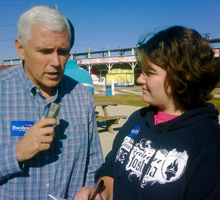 ical process and encouraging them to become leaders, and is now vice president of her local club.
ical process and encouraging them to become leaders, and is now vice president of her local club.
Generation Joshua sponsors Benjamin Rush scholarships to encourage members to get involved in politics and their local communities. To fulfill some of the service requirements, Judah opened up her home for meet-and-greets with area candidates. Four years later, she still hosts candidates in her home regularly.
Judah plans to stay politically active and would like to be a legislative assistant.
What is an issue that you think is most pressing for our country right now and why?
I think mostly it’s the oppression of Christians who are involved or who just want to go to church, and schools teaching evolution. I’ve been most supportive of one of the new laws that says that schools can choose their own curriculum, like whether they want to choose to teach evolution or Christian science.
What would you say to someone who doesn’t think that politics is important?
Politics does affect your life, whether it’s in the grocery store, the food you eat, or in your schools. Government has a hand in almost everything. Whenever you get up, your time is controlled by the government ’cause of daylight savings or things like that. The government has a hand in what kind of food you can buy from the store, in sales tax, what kind of clothes you wear, what you’re taught in schools. So it is pretty important and you need to get yourself out there and know what the government is doing.
What advice would you give to other kids, who want to get politically involved?
The best way to get involved is just to put yourself out there and make yourself known to be someone who would really help even if they’re out of their comfort zone ’cause that really encourages people.
Jason Rae, 25, Milwaukee, WI
by Carmela Verderame, 12, Y-Press
Jason Rae became interested in politics early, and at age 17 became the youngest delegate to go to the 2004 Democratic National Convention. He was also the youngest super delegate in 2008, which means he was elected based on his involvement in the Democratic National Convention. He is also the youngest person to be elected to the Democratic National Committee in 2012.
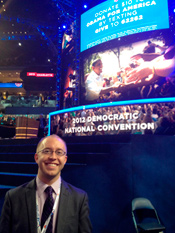 His role this year, as chair of the DNC's Youth Council, is to get young people involved in political activities. This council, which he helped to found, was started seven years ago to get young people – defined as those under age 36 – to assume leadership roles in the DNC. This year, there are 644 youth delegates to the DNC.
His role this year, as chair of the DNC's Youth Council, is to get young people involved in political activities. This council, which he helped to found, was started seven years ago to get young people – defined as those under age 36 – to assume leadership roles in the DNC. This year, there are 644 youth delegates to the DNC.
What issues do you think is most pressing for our nation?
I think there are a lot of pressing issues, but first and foremost is ensuring that the American economy continues to grow and that everyone pays their fair share. We see too many Americans like Mitt Romney getting by without their fair share while middle-class people struggle.
What do you plan to do after the convention is over?
I'll still be chairing the DNC Youth Council and working to continue finding ways to involve more young people in the party.
So what do you feel is your biggest accomplishment career?
One of the things I'm most proud of at least is working through the DNC Youth Council and helping work with the national convention to plan the youth activities related to the convention. In particular, (I'm proud of) working with young people and training them on the delegate selection process so that they can get themselves elected as delegates or alternates for the convention. Because of that, we saw a record number of young delegates elected this past year, and that's one that really makes me proud.
What kind of advice would you give to youth who feel that politics doesn't affect them?
Everything that's a side of politics has an effect on their daily lives. While they might not realize it, the federal budget will have an effect on them. But really, the candidates we are electing are going to decide whether or not they are going to have equal rights or whether or not they are going to have health insurance or things like that.
Daqavise Winston, 18, Muncie, IN
by Isaiah Treadwell, 17, Y-Press
Daqavise Winston has always had a love for politics and for his community. “I enjoy working with the policy and electoral process,” he explained.
In high school, he joined the presidential campaign of U.S. Sen. Hillary Clinton and was asked to lead the Indiana High School Democrats, which represents High School Democrats chapters across the state. He al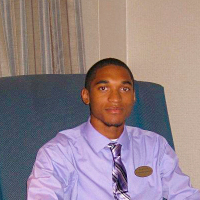 so became coSalaincommunications director of the High School Democrats of America.
so became coSalaincommunications director of the High School Democrats of America.
Currently a freshman at Ball State University, he intends to major in social studies education. Still, he’s campaigning for Democrats Joe Donnelly for U.S. Senate and John Gregg for governor and serving as chairman of the platform committee of Indiana Young Democrats. “It is my duty to help write a platform that we hope our state party will adopt in 2014,” he explained. “This platform will more in tune to what Democrats stand for across the spectrum.”
Describe the issue you think is most pressing for our country. Why?
The economy, hands down. Our fiscal crisis is the most pressing issue we have faced in awhile. It is very saddening when we see our elected officials put their elections before the people they were elected to serve. I will take a lot of heat for this next statement (but) Democrats have to realize that we must have balanced budgets that cut spending and reform entitlement programs. I commend Representative Paul Ryan for his courage to take on the task of cutting waste and reforming entitlement programs. According to researchers, youth voter turnout increased from 2004 to 2008; however, fewer youth are expected to turn out for this year’s election.
Why do you think that is?
For one, youth are not taken as serious as they should be. In 2008, because of the nature of the campaigns, youth had many reasons to be excited and involved as they were given more options of getting involved besides the usual phone bank and canvass jobs. This year, the main issues are not ones that excite youth or really pertain to them.
Do you see yourself as politically involved in the future?
I hope to one day be a candidate myself. In the meantime, I will continue to be involved in the elections here in Indiana and encourage others to get involved in shaping the direction and policy of the future.
See additional profiles » » DOWNLOAD PDF OF ALL 20 PROFILES »
To get a youth perspective on the 2012 Presidential Elections, WKCD has teamed up with the youth-led news bureau, Y-Press, based in Indianapolis. Originally part of the Children’s Express, Y-Press has nurtured young journalists for more than 20 years. Their stories and articles—on local, national, and global topics—appear every other week in the Indianapolis Star. The Y-Press web site is updated regularly and encourages external submissions and comments about youth-written stories and reviews.
Here, Y-Press reporters will be posting: stories about the campaign, the candidates, and youth perspectives on the political process profiles and interviews with young political activists results from surveys they’ve created to gather information from youth nationwide about the candidates and the issues most important to young people reports from the floor at both of this summer’s national conventions. Check back often to keep up with this special “youth beat” on Election 2012.
